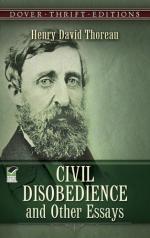
|
| Name: _________________________ | Period: ___________________ |
This test consists of 15 multiple choice questions and 5 short answer questions.
Multiple Choice Questions
1. How did Thoreau say med should treat the government when acting immorally in 'Slavery in Massachusetts'?
(a) With obedience.
(b) With compassion.
(c) With logic.
(d) With contempt.
2. What attribute does Thoreau say all men should have naturally in 'Slavery in Massachusetts'?
(a) Respect.
(b) Choice.
(c) Intelligence.
(d) Freedom.
3. How does Thoreau begin 'Civil Disobedience'?
(a) He gives a motto.
(b) He relates an experience.
(c) He cites a scripture.
(d) He reads a poem.
4. What was Anthony Burns's occupation?
(a) Waiter.
(b) Servant.
(c) Slave.
(d) Driver.
5. What did Thoreau describe as very clean in 'Civil Disobedience'?
(a) His soul.
(b) His jail cell.
(c) His state.
(d) His mind.
6. What kind of meeting was Thoreau asked to speak at before giving his speech, 'Slavery in Massachusetts'?
(a) A Union meeting.
(b) A Civil War discussion.
(c) An anti-slavery meeting.
(d) A presidential debate.
7. What was attacked when Anthony Burns was in custody?
(a) A prison.
(b) A police station.
(c) A train station.
(d) A courthouse.
8. What part of man does Thoreau say government can NEVER manipulate?
(a) The physical part.
(b) The emotional part.
(c) The intelligent part.
(d) The moral part.
9. What holiday did Thoreau give 'Slavery in Massachusetts' on?
(a) Thanksgiving.
(b) Valentine's Day.
(c) Independance Day.
(d) Halloween.
10. How does Thoreau describe the attack made to free Burns?
(a) Necessary.
(b) Angering.
(c) Sadddening.
(d) Heroic.
11. What does Thoreau say is not always found in the majority?
(a) Justice.
(b) Reform.
(c) Courage.
(d) Practicality.
12. What did Thoreau say most media devices were striving to do?
(a) Appease the masses.
(b) Reflect the truth.
(c) Gain approval.
(d) Make money.
13. What does Thoreau say happens when government gets involved in politics?
(a) It changes the perspective.
(b) It gets in the way.
(c) It allows for growth.
(d) It simplifies things.
14. What were Abolitionists against?
(a) War.
(b) Change.
(c) Socialism.
(d) Slavery.
15. What does Thoreau say he is NOT in 'Civil Disobedience'?
(a) A democrat.
(b) An anarchist.
(c) A socialist.
(d) A monarchist.
Short Answer Questions
1. Where in the U.S. was Thoreau most interested in the slavery debate?
2. What does Thoreau hope to inspire men to do after 'Civil Disobedience'?
3. What congressional act was discussed at the meeting Thoreau was asked to speak at before giving his speech, 'Slavery in Massachusetts'?
4. How does Thoreau say soldiers are expected to perform their duties?
5. What city did Thoreau give 'Slavery in Massachusetts' on?
|
This section contains 386 words (approx. 2 pages at 300 words per page) |

|




